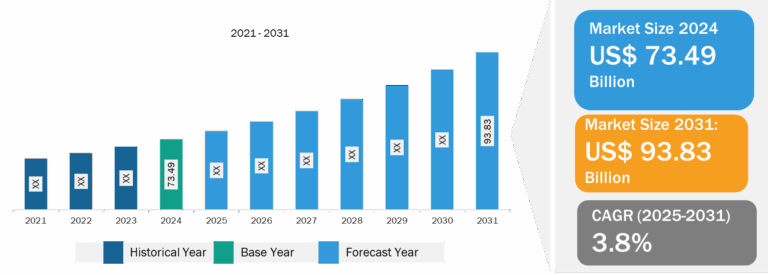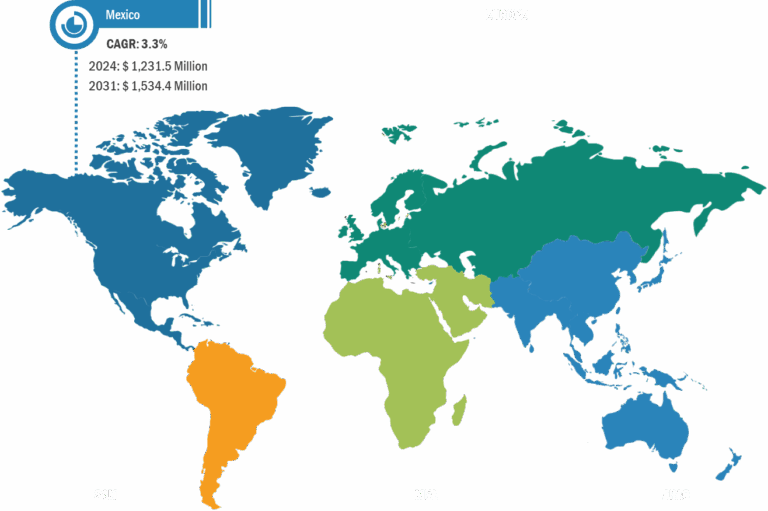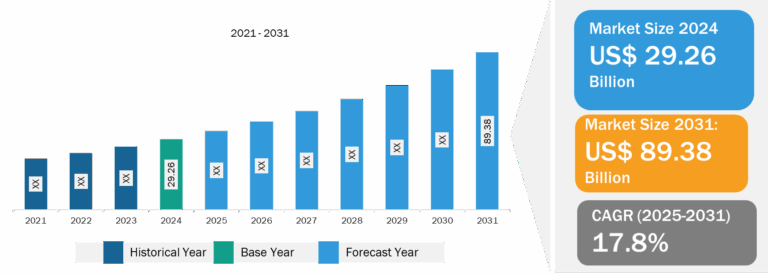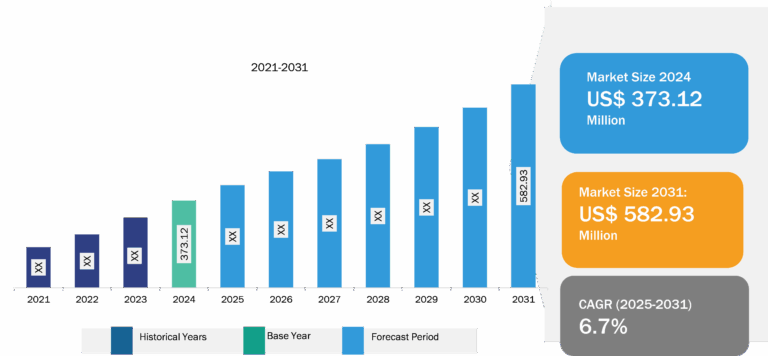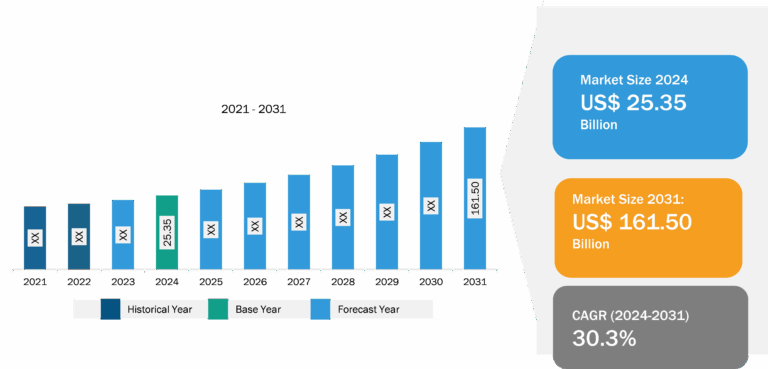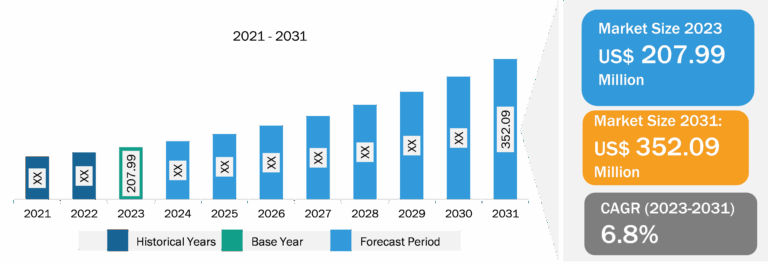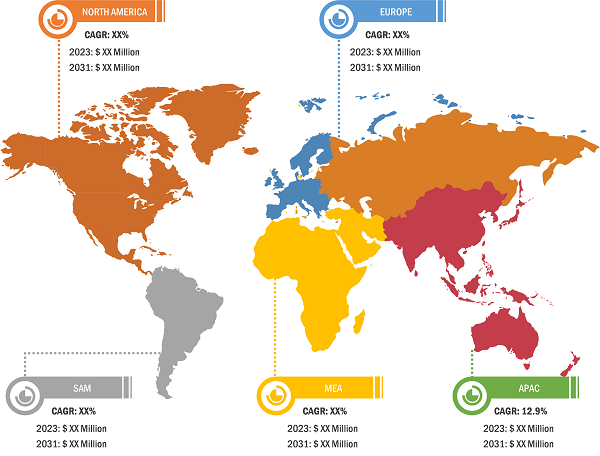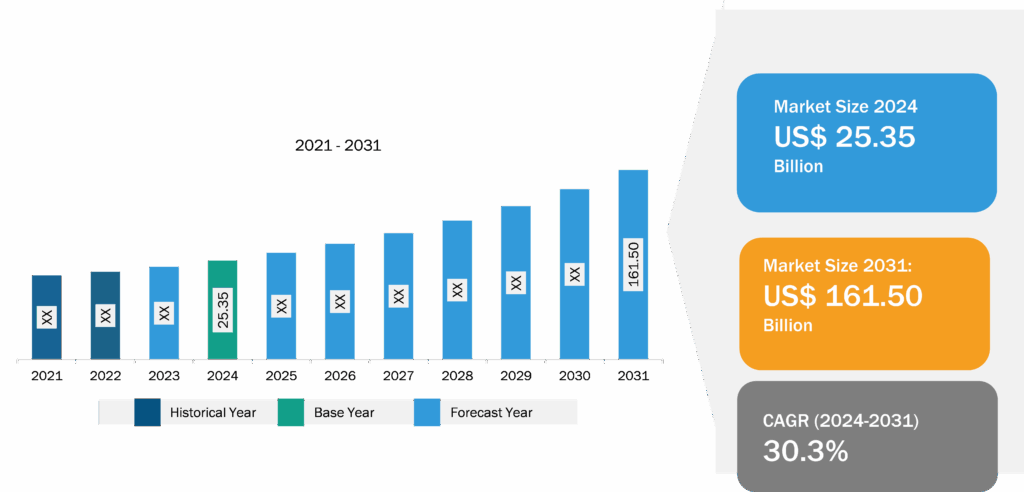
Data Protection as a Service Market
According to a new comprehensive report from The Insight Partners, the global data protection as a service market is observing significant growth owing to the rising incidence of data breaches, the need for cost-effective data protection solutions, government regulations for enhanced cybersecurity to protect consumer data, and the rising BYOD trends.
The report runs an in-depth analysis of market trends, key players, and future opportunities. Moreover, costly attacks and rising remote work adoption significantly drive organizations to opt for data protection as a service offering.

Overview of Report Findings
- Market Growth: The data protection as a service market size was valued at US$ 25.35 billion in 2024 and is expected to reach US$ 161.50 billion by 2031; it is estimated to record a CAGR of 30.3% from 2024 to 2031. Cyber threats have serious consequences for individuals, corporations, and governments. As a result, many firms are concentrating on data protection as part of their larger cybersecurity initiatives. Organizations can better protect themselves from data breaches and other types of cyberattacks by implementing a robust data protection strategy. Thus, with a continuous surge in cyberattack incidences, data protection as a service (DPaaS) has become essential for businesses to safeguard the sensitive information they collect or generate. DPaaS offers business continuity through automated backups and disaster recovery solutions, minimizing downtime following an attack. It aids in scalability, allowing companies to modify security measures as they grow; moreover, opting for a service is more cost-effective than having an in-house security infrastructure, particularly for smaller businesses. Thus, an upsurge in the number of cyberattacks has bolstered the importance of cybersecurity to safeguard critical infrastructures and ensure data safety, thereby fueling data protection as a service market growth.
- Technological Innovations: The usage of artificial intelligence (AI) and machine learning (ML) in data protection as a service is a relatively new development. Nonetheless, it has the potential to become a popular choice for authentication in the coming years. Organizations can enhance the effectiveness and resilience of their data protection as a service offering by leveraging AI technology. AI and ML technologies can analyze vast data volumes to identify patterns and detect anomalies indicating a security breach or potential vulnerability. These technologies transform threat detection capabilities by enabling systems to identify and respond to potential security breaches in real time by using advanced behavioral analytics and pattern recognition. Moreover, AI and ML enable more sophisticated classification and categorization of sensitive information. These technologies can automate content analysis, apply appropriate protection levels, and manage data lifecycle policies more effectively, reducing the manual overhead traditionally associated with data protection while improving the accuracy and consistency of data handling practices. Thus, the surging incorporation of artificial intelligence and machine learning is emerging as a noteworthy trend in the data protection as a service market.
- Rising Investments in Cloud-Based Solutions: Organizations worldwide increasingly invest in cloud solutions, significantly moving away from traditional IT infrastructure spending. In October 2024, Oracle announced plans to invest more than US$ 6.5 billion to open a public cloud region in Malaysia. The upcoming cloud region will enable Oracle customers and partners in Malaysia to leverage AI infrastructure and services, and migrate mission-critical workloads to Oracle Cloud Infrastructure (OCI). Further, in January 2025, Amazon Web Services (AWS) announced its plans to invest US$ 8.3 billion in cloud infrastructure in the AWS Asia Pacific (Mumbai) Region in Maharashtra, India. This initiative aims to enhance the country’s cloud computing capabilities and is expected to contribute US$ 15.3 billion to India’s GDP by 2030. In the same month, Microsoft also announced an investment of US$ 3 billion to expand its cloud computing and artificial intelligence capabilities in India. Such growing investment in cloud solutions is expected to create a substantial opportunity for data protection as a service market growth in the coming years.
- Geographical Insights: In 2024, North America led the market with a substantial revenue share, followed by Europe and Asia Pacific. Moreover, Asia Pacific is anticipated to record the highest CAGR in the market during the forecast period.
Market Segmentation
- Based on deployment, the data protection as a service market is segmented into public cloud, hybrid cloud, and private cloud. The public cloud segment held the largest share in the data protection as a service market in 2024.
- Based on enterprise size, the data protection as a service market is bifurcated into large enterprises and SMEs. The large enterprises segment held the largest share in the data protection as a service market in 2024.
- Based on end-user industry, the data protection as a service market is segmented into IT and telecom, BFSI, healthcare, manufacturing, retail and e-commerce, and others. The IT and telecom segment held the largest share in the data protection as a service market in 2024.
- The Data Protection as a Service market is segmented into five major regions: North America, Europe, APAC, Middle East and Africa, and South and Central America. North America dominated the Data Protection as a Service market in 2024.
Competitive Strategy and Development
- Key Players: A few major companies operating in the data protection as a service market include Amazon Web Services Inc; Hewlett Packard Enterprise Co; International Business Machines Corp; Oracle Corp; Kyndryl Holdings Inc; Broadcom Inc; Cisco Systems Inc; Dell Technologies Inc; Microsoft Corp and Hitachi Vantara Corp.
- Trending Topics: Data Protection, Multi-factor Authentication, Identity Verification, among others.
Global Headlines
- “Amazon Web Services announced the availability of AWS Backup in the Asia Pacific (Thailand) Region. AWS Backup is a fully managed, policy-driven service that allows one to centrally automate data protection across multiple AWS services spanning compute, storage, and databases. Using AWS Backup, one can centrally create and manage backups of application data, protect data from inadvertent or malicious actions with immutable recovery points and vaults, and restore data in the event of a data loss incident.”
- “Oracle announced the availability of Oracle Cloud Infrastructure Zero Trust Packet Routing, which is built into the network fabric of Oracle Cloud Infrastructure (OCI). This helps to curtail any unauthorized access to data by separating network security from the underlying architecture. Based on the 2023 initiative to develop a new open standard with Applied Invention and other organizations, OCI Zero Trust Packet Routing enables organizations to set security attributes on resources and write natural language policies that limit network traffic based on the resources and data services accessed.”
Conclusion
Organizations of all sizes worldwide must comply with complex regulations related to data security. According to the Privacy Laws and International Business Report, as of 2023, 83% of countries had passed data protection and privacy legislation, in contrast to 66% in 2020. The General Data Protection Regulation (GDPR), established in 2018, is a comprehensive data privacy framework enacted by the European Union (EU) to safeguard the personal information of individuals. Similarly, in the US, the Health Insurance Portability and Accountability Act (HIPAA), passed in 1996, establishes guidelines for healthcare entities and businesses to handle patients’ personal health information (PHI) to guarantee confidentiality and security. The California Consumer Privacy Act (CCPA) is a landmark data privacy law in the US that compels transparency in businesses about their data practices and empowers individuals to have more control over their personal information. In addition, the Payment Card Industry Data Security Standard (PCI-DSS) is a set of regulatory guidelines designed to safeguard credit card data. Noncompliance with regulatory measures can lead to significant fines, legal consequences, and reputational damage. Thus, organizations need to capitalize on updating their data protection measures to ensure compliance with various regulations and protect sensitive data. Outsourcing data protection to a DPaaS provider reduces the risk of noncompliance. Adopting DPaaS allows businesses to avoid penalties and gain greater trust among customers and partners by prioritizing privacy and data security. Thus, stringent government regulations such as GDPR, CCPA, and HIPAA fuel the data protection as a service market growth
The report from The Insight Partners, therefore, provides several stakeholders—including component/material suppliers, Data Protection as a Service manufacturers, retailers and authorized distributors, and end users —with valuable insights into how to successfully navigate this evolving market landscape and unlock new opportunities.

